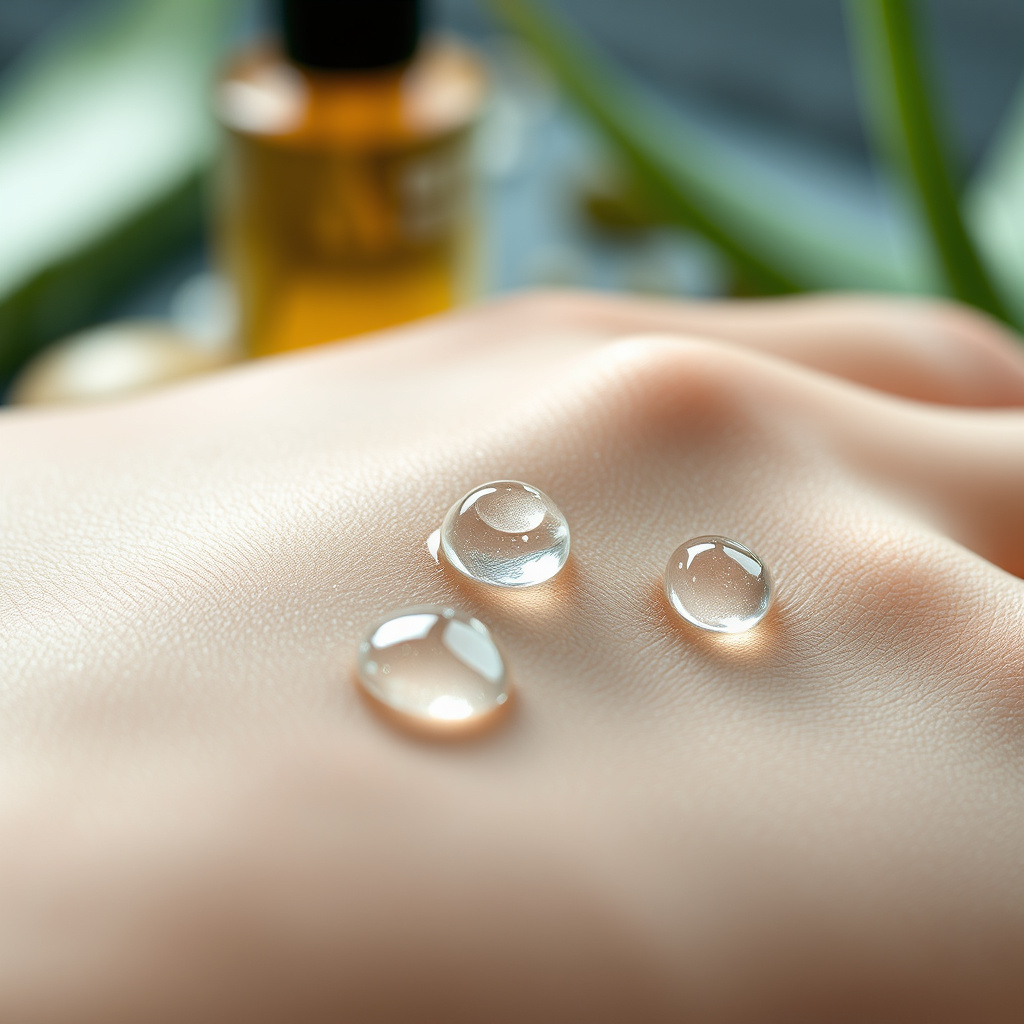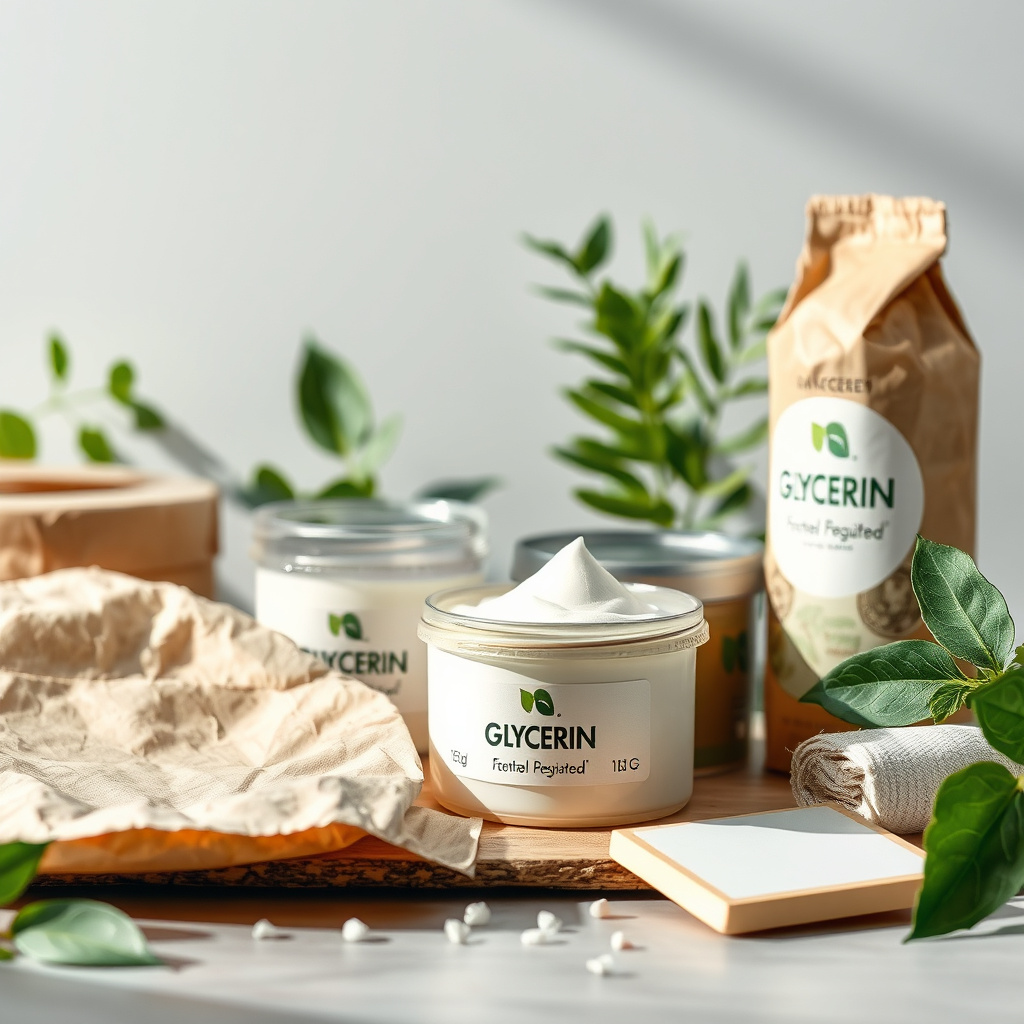How glycerin acts as a humectant in cosmetic formulations involves its ability to attract moisture from the environment, helping to keep skin hydrated and healthy.
Have you ever wondered how glycerin works as a humectant in cosmetic formulations?
In this post, we will explore the science behind glycerin and its incredible ability to draw moisture, making it a key ingredient in skincare products.
You’ll learn how glycerin not only benefits formulations but also enhances the skin’s hydration levels, leading to healthier and more radiant skin. Get ready to discover why glycerin is a sought-after ingredient in the cosmetics industry!
Unlocking the Secrets of Glycerin in Cosmetic Formulations
In the realm of cosmetic science, few ingredients stand out quite like glycerin. Known for its remarkable ability to attract moisture, glycerin plays a crucial role in many products we use daily, from lotions to serums. Understanding how glycerin functions as a humectant in cosmetic formulations can help consumers make informed choices about the products they apply to their skin.
What Makes Glycerin Essential?
Glycerin, a natural compound derived from vegetable oils or animal fats, is celebrated for its versatility and effectiveness. As a humectant, it draws water from the environment into the skin, ensuring hydration levels remain optimal. This property is particularly beneficial for individuals with dry or sensitive skin, as glycerin helps to create a barrier that locks in moisture.
The Science Behind Glycerin’s Hydration
When glycerin is incorporated into a formulation, it interacts with the skin’s outer layer, attracting moisture and holding it there. This process not only enhances skin hydration but also contributes to a smoother, plumper appearance. In addition to its hydrating benefits, glycerin also aids in improving the overall texture and feel of cosmetic products, making them more pleasant to use.
Common Uses of Glycerin in Cosmetics
- Moisturizers: Glycerin is a key ingredient in many moisturizing creams and lotions, providing lasting hydration.
- Cleansers: In facial cleansers, glycerin helps maintain moisture balance, preventing dryness after washing.
- Serums: Glycerin is often found in serums aimed at delivering concentrated hydration.
- Makeup Products: Many foundations and primers use glycerin to create a smooth application and dewy finish.
Choosing the Right Glycerin for Your Needs
When looking for glycerin to incorporate into your cosmetic formulations, it’s important to select high-quality sources. Whether you’re a manufacturer seeking to buy glycerin wholesale or searching for a glycerin supplier near me, ensure that the glycerin is of food grade quality, especially if it’s intended for skin applications. A reputable glycerin supplier can provide insights into the glycerin production process, helping you make informed decisions.
Currently, the demand for glycerin in cosmetics is on the rise, as consumers increasingly seek products that prioritize hydration and skin health. With options ranging from bulk glycerin suppliers to specialized vegetable glycerin suppliers, the market is rich with choices. By understanding the role of glycerin and its benefits, formulators can create effective products that meet the growing expectations of consumers.
Why Glycerin Stands Out
In a world filled with cosmetic ingredients, glycerin’s unique properties make it a standout choice. Not only is it effective, but it is also gentle on the skin, making it suitable for all skin types. The versatility of glycerin allows it to be used in a wide range of formulations, providing both hydration and a pleasant user experience. Whether you’re looking for glycerin for cosmetics or exploring various glycerin sourcing options, understanding its benefits can enhance your formulation strategy and ultimately lead to happier, healthier skin.
The Science Behind Humectants: Glycerin’s Unique Properties
Glycerin, often celebrated for its remarkable benefits, plays a vital role in the world of cosmetics. Understanding how it functions as a humectant can shed light on its effectiveness in skincare and beauty products. At its core, glycerin is a naturally occurring compound derived from fats and oils, making it a versatile ingredient in a variety of formulations.
What Makes Glycerin Special?
One of the most intriguing attributes of glycerin is its ability to attract and retain moisture. This property stems from its hygroscopic nature, which means it draws water from the air and from deeper layers of the skin to the surface. When included in products, glycerin acts like a sponge, ensuring that the skin remains hydrated and plump. This is particularly beneficial in formulations designed for dry or dehydrated skin, as it helps to create a barrier that locks in moisture.
- Moisture Retention: Glycerin helps maintain skin hydration by preventing water loss.
- Skin Barrier Support: It reinforces the skin’s natural barrier, promoting overall skin health.
- Compatibility: Glycerin is gentle and suitable for a wide range of skin types, including sensitive skin.
How Does Glycerin Interact with Other Ingredients?
In the realm of cosmetic formulations, glycerin’s compatibility with various ingredients enhances its effectiveness. It can be combined with oils, emulsifiers, and other humectants to create a balanced product that delivers optimal hydration. This synergy not only improves the texture and feel of the product but also boosts its performance. For those looking to explore Glicerina para Cosméticos, sourcing glycerin from reputable suppliers ensures high-quality ingredients that enhance formulation integrity.
The Glycerin Production Process
The journey of glycerin from raw materials to a finished product is fascinating. Typically, glycerin is produced through the process of saponification or from the fermentation of plant materials. This means that it can be derived from both animal and vegetable sources, providing options for various cosmetic applications. For those in the industry, knowing where to buy glycerin wholesale or finding a reliable glycerin supplier near me can significantly affect the quality of the final product.
Glycerin in Daily Skincare Routines
Incorporating glycerin into daily skincare routines can lead to noticeable improvements in skin texture and hydration. Products like serums, lotions, and creams that feature glycerin can provide a refreshing boost to the skin, especially in climates where humidity levels fluctuate. As consumers prioritize hydration and nourishment in their skincare choices, the demand for glycerin-rich formulations continues to rise.
By understanding the unique properties of glycerin and its role as a humectant, individuals can make informed decisions about the products they choose. Whether one is a manufacturer seeking to enhance formulations or a consumer looking for effective skincare options, glycerin remains a key player in achieving healthy, hydrated skin.
Glycerin in Skincare: Benefits and Applications
When it comes to skincare, the quest for hydration is a common goal for many people. This is where glycerin for cosmetics shines as a powerful ingredient. Known for its ability to attract moisture, glycerin acts as a humectant, drawing water from the environment into the skin. This characteristic makes it an ideal component in various formulations, providing lasting hydration and helping to maintain the skin’s natural moisture balance.
The Hydration Hero
One of the standout benefits of glycerin is its effectiveness in keeping the skin hydrated. When applied, it forms a protective layer on the skin’s surface, preventing moisture loss. This is particularly beneficial for those with dry or sensitive skin, as it helps to alleviate discomfort and improve overall skin texture. The result is a plump, healthy complexion that feels soft and supple.
Versatility in Formulations
Glycerin’s versatility makes it a popular choice among formulators. It can be found in a range of products, from creams and lotions to serums and cleansers. By incorporating glycerin, skincare manufacturers can enhance the effectiveness of their products, delivering a boost of hydration while also promoting a smooth application. This means that even lightweight formulas can provide substantial moisture, making them suitable for all skin types.
Skin Barrier Support
In addition to its humectant properties, glycerin plays a significant role in supporting the skin’s barrier function. A healthy skin barrier is crucial for protecting against environmental stressors and maintaining moisture levels. Glycerin helps to reinforce this barrier, making it an essential ingredient for anyone looking to improve their skin’s resilience. By choosing products that contain glycerin for cosmetics, you can take a proactive approach to skincare, ensuring your skin stays healthy and hydrated.
Finding Quality Glycerin
When searching for glycerin, it’s essential to consider sourcing options. Whether you are a manufacturer looking to buy glycerin wholesale or a consumer searching for a glycerin supplier near you, ensuring the quality of the product is paramount. High-quality glycerin, particularly food-grade glycerin, is often recommended for cosmetic formulations, ensuring safety and efficacy. Partnering with reputable suppliers can make all the difference in formulating effective skincare products.
Application Techniques
Incorporating glycerin into your skincare routine can be done in several ways. For maximum benefit, consider layering glycerin-containing products. Start with a hydrating serum, followed by a moisturizer that includes glycerin. This layered approach can enhance hydration levels, making your skin feel refreshed and revitalized. Additionally, glycerin can be added to DIY skincare recipes, allowing you to customize your products to meet your specific needs.
In the present landscape of skincare, glycerin continues to be a staple ingredient due to its remarkable benefits and versatility. As you explore the world of skincare formulations, keep an eye out for glycerin for cosmetics to unlock the full potential of hydration for your skin.
Formulating with Glycerin: Best Practices for Manufacturers
In the dynamic world of cosmetic formulation, understanding how to effectively use glycerin is crucial for manufacturers aiming to create high-quality products. Glycerin, renowned for its humectant properties, plays a vital role in hydrating and maintaining skin moisture. As formulators dive deeper into the science of glycerin, it’s essential to adopt best practices that maximize its benefits.
Understanding Glycerin’s Role
Glycerin acts as a powerful humectant, drawing moisture from the environment into the skin. This characteristic is particularly valuable in formulations designed for dry or dehydrated skin. When incorporating glycerin, manufacturers should consider the concentration levels to ensure optimal hydration without compromising the product’s texture. Typically, a concentration of 2% to 10% is effective, but this can vary depending on the specific formulation and desired outcome.
Choosing the Right Type of Glycerin
Not all glycerin is created equal. When sourcing glycerin, manufacturers must pay attention to the quality and type. There are different grades of glycerin available, including food grade and cosmetic grade. For Glicerina para Cosméticos, it is imperative to choose a supplier that provides high-quality, cosmetic-grade glycerin. This ensures that the product is safe for skin applications and free from harmful contaminants. Working with a trusted glycerin manufacturer can greatly affect the overall quality of the final product.
Incorporation Techniques
The method of incorporating glycerin into formulations can significantly influence the product’s performance. It’s recommended to blend glycerin with other water-soluble ingredients at the beginning of the formulation process. This technique helps in achieving a uniform distribution throughout the product, enhancing its efficacy. Additionally, manufacturers should be mindful of the order of ingredient addition, as glycerin can impact the stability of emulsions if not handled properly.
Balancing with Other Ingredients
To optimize the hydrating effects of glycerin, it’s important to balance it with other ingredients. Combining glycerin with oils or occlusive agents can create a synergistic effect, effectively sealing in moisture and providing a protective barrier on the skin. Formulators should explore various combinations that can enhance product performance while maintaining a pleasant texture and sensory experience.
Testing and Stability
Before launching any product, thorough testing is essential. Manufacturers should conduct stability tests to ensure that the inclusion of glycerin does not compromise the formulation over time. Observing how glycerin interacts with other components during storage can help avoid issues such as separation or changes in viscosity. Regular assessments will provide insights into how glycerin contributes to the product’s shelf life and efficacy.
Scaling Up Production
When transitioning from small-scale formulations to larger production runs, maintaining consistency is key. Manufacturers should establish clear protocols for measuring and mixing glycerin to avoid discrepancies in different batches. Utilizing bulk glycerin suppliers can streamline the sourcing process, ensuring a steady supply of high-quality glycerin for ongoing production needs.
By implementing these best practices, manufacturers can leverage the benefits of glycerin to create effective and appealing cosmetic products. Whether you are looking to buy glycerin wholesale or seeking a reliable glycerin supplier near me, understanding the nuances of glycerin formulation will position your brand for success in the competitive cosmetic market.
The Global Demand for Glycerin: Trends and Market Insights
As the beauty and personal care industry continues to evolve, the demand for glycerin has become increasingly significant. Glycerin, known for its moisturizing properties, plays a crucial role in various cosmetic formulations. With a focus on sustainability and natural ingredients, many brands are turning to glycerin as a key component to enhance their products. The shift towards clean beauty is driving the need for high-quality, natural ingredients, which has led to an uptick in glycerin sourcing options.
Market Trends Influencing Glycerin Demand
Currently, there is a noticeable trend towards using plant-derived ingredients in cosmetic formulations. This has contributed to the rising popularity of glycerin, particularly among brands that prioritize eco-friendly practices. As consumers become more aware of the ingredients in their skincare products, they are seeking out formulations that include glycerin for cosmetics due to its effectiveness and safety profile.
- The shift towards natural and organic products is prompting manufacturers to explore sustainable glycerin sourcing options.
- Glycerin’s multi-functional properties make it an attractive ingredient for a wide range of products, from moisturizers to cleansers.
- The increasing interest in DIY skincare has led to more individuals looking to buy glycerin wholesale for personal use.
Industry Insights: Glycerin’s Versatility
Glycerin’s versatility is one of the reasons for its growing acceptance in the market. It serves not only as a humectant but also as a solvent and emollient, making it a valuable ingredient for various formulations. This versatility allows cosmetic manufacturers to create products that cater to different skin types and needs. Moreover, the glycerin production process has advanced, enabling suppliers to provide high-quality glycerin that meets the demands of modern consumers.
The Role of Suppliers in Meeting Demand
The expansion of glycerin usage in cosmetics has led to an increase in glycerin suppliers, making it easier for manufacturers to find reliable sources. Whether searching for a vegetable glycerin supplier or exploring options for bulk glycerin suppliers, companies are now more equipped to meet the rising demand for glycerin products. This accessibility is crucial, especially for brands looking to formulate products that align with consumer expectations for quality and sustainability.
In summary, glycerin continues to be an essential ingredient in the cosmetic industry, driven by trends towards natural formulations and an increasing focus on sustainability. As the market evolves, the importance of finding a trustworthy glycerin manufacturer will remain paramount for brands aiming to deliver effective and safe products to their customers.
Future Innovations: Glycerin and Emerging Cosmetic Formulations
As the cosmetic industry continues to evolve, the emphasis on natural and effective ingredients has never been more pronounced. At the heart of this transformation lies glycerin, a versatile compound that has been a staple in cosmetic formulations for its remarkable properties. Glicerina para Cosméticos is gaining traction, particularly as brands seek to combine efficacy with a commitment to sustainability and safety.
Exploring Glycerin’s Role in Future Formulations
Innovators in the cosmetic field are increasingly recognizing the potential of glycerin beyond its traditional applications. With its humectant qualities, glycerin attracts moisture to the skin, making it an essential ingredient in serums, moisturizers, and creams. As the demand for hydrating and skin-friendly products rises, the incorporation of glycerin in new formulations is becoming more prevalent. This trend reflects a broader consumer desire for products that not only deliver results but also align with their values.
Emerging Trends in Glycerin Use
Currently, there are several exciting trends surrounding glycerin in cosmetic formulations:
- Plant-Based Sourcing: With the rise of environmentally conscious consumers, the shift toward plant-derived ingredients has become a focal point. Glycerin sourced from vegetable origins is particularly appealing, offering a sustainable option for formulators.
- Enhanced Synergy with Other Ingredients: As formulators experiment with various combinations, glycerin is often paired with botanical extracts and essential oils to enhance the overall efficacy of products. This synergy not only improves hydration but also boosts the sensory experience.
- Multi-Functional Products: The trend towards all-in-one solutions has propelled glycerin into the spotlight, as it plays a crucial role in formulations designed for multiple skincare benefits. Products that cleanse, hydrate, and protect the skin are increasingly sought after.
Formulating with Glycerin: Best Practices
For manufacturers looking to harness the power of glycerin, understanding its properties and how to effectively incorporate it into formulations is fundamental. The ideal concentration of glycerin can vary, but generally, a range of 3% to 10% is effective for achieving optimal hydration without compromising the texture of the product. It’s essential for formulators to balance glycerin with other ingredients to maintain the desired consistency and sensory attributes.
In the quest for high-quality glycerin, sourcing from reputable suppliers is crucial. Finding a reliable glycerin supplier near me or exploring options like bulk glycerin suppliers can ensure that manufacturers have access to top-grade materials. This is particularly important as the market becomes more competitive, and quality can differentiate successful brands from the rest.
The Future Landscape of Glycerin in Cosmetics
As we look ahead, the role of glycerin in cosmetics is set to expand. With ongoing research into its benefits and applications, there is much to anticipate. The increasing global demand for safe, effective, and sustainable beauty products will likely drive innovation in glycerin formulations, making it a key player in the future of the cosmetic industry. In this dynamic landscape, brands that prioritize quality and transparency in their sourcing and formulation processes—especially those focusing on glicerina para cosméticos—are poised to thrive.






